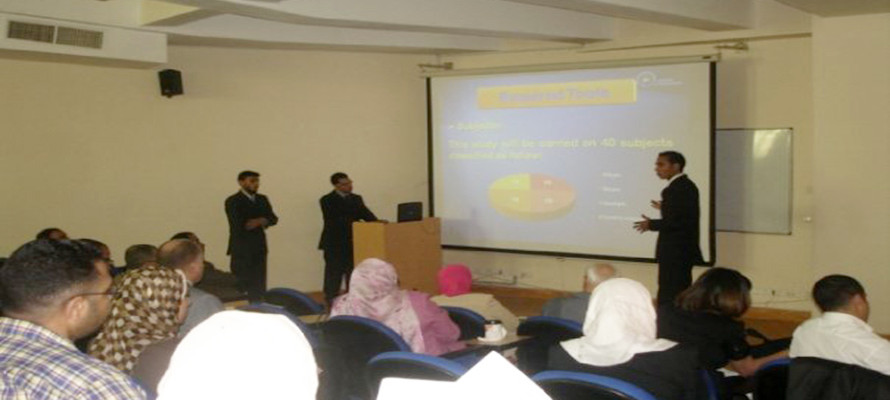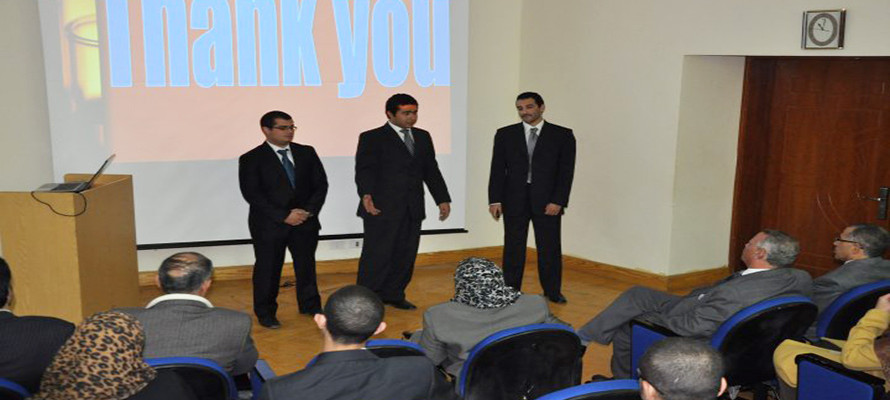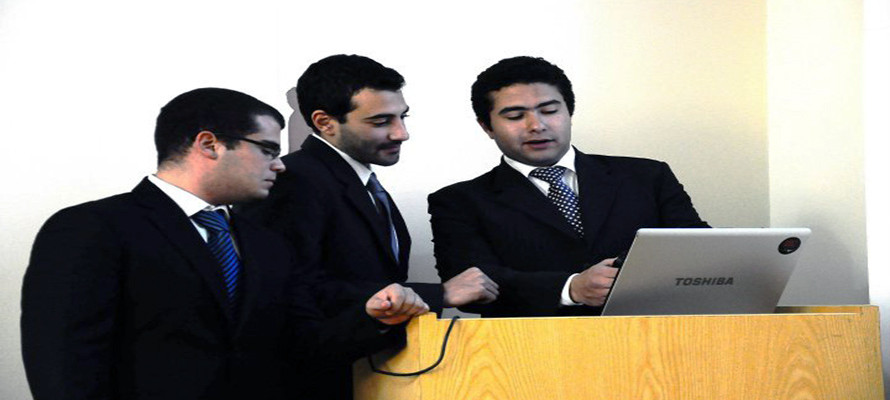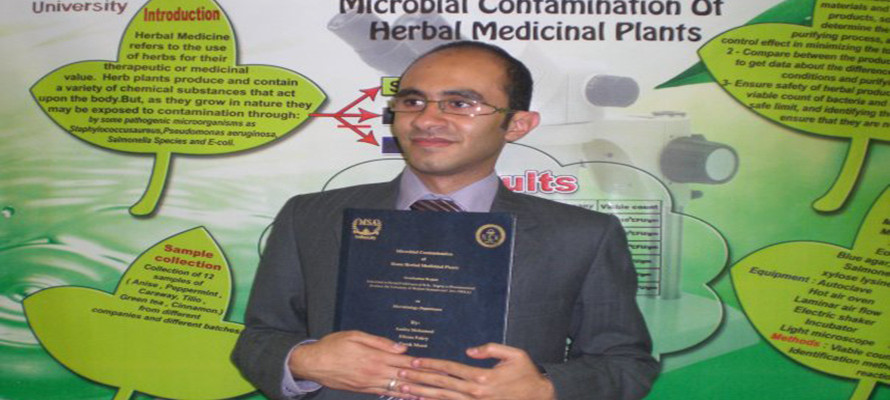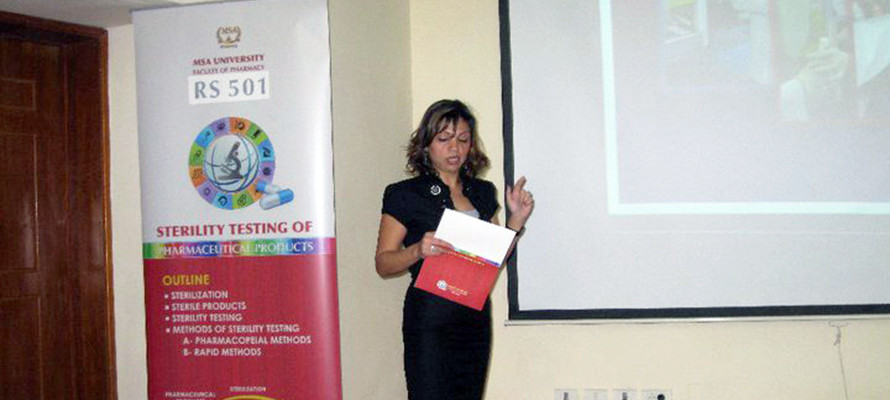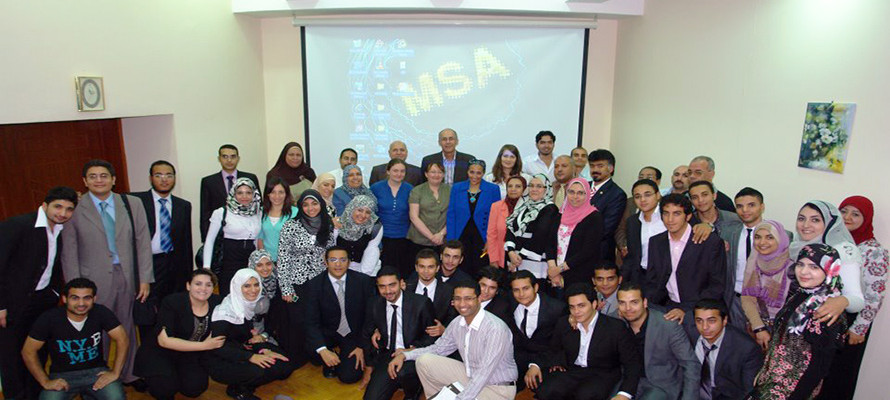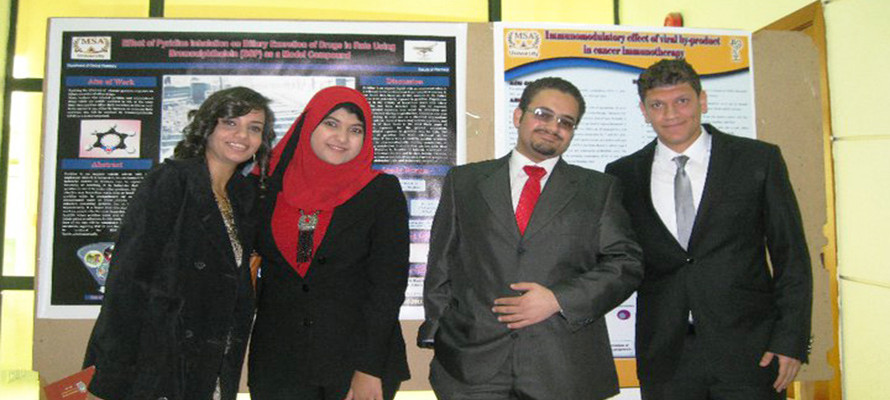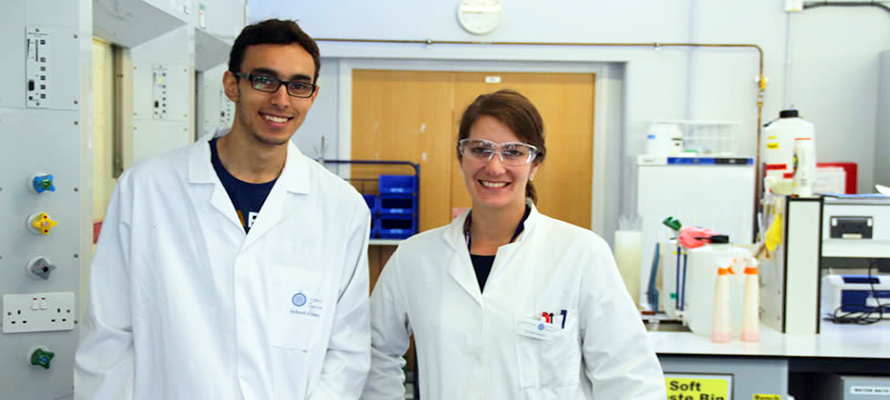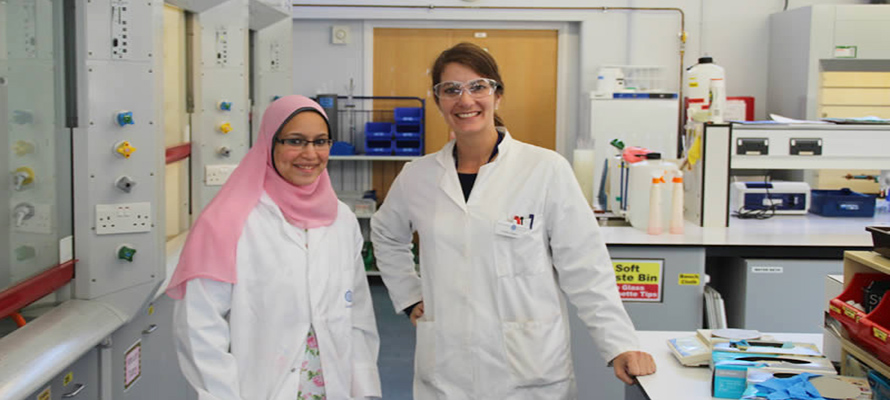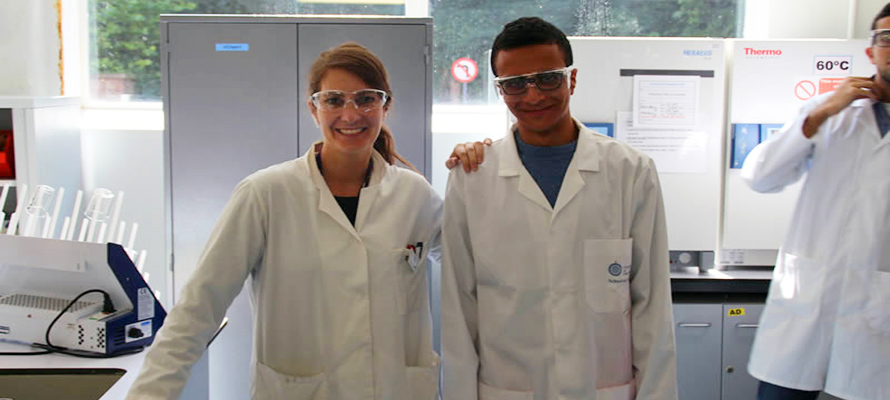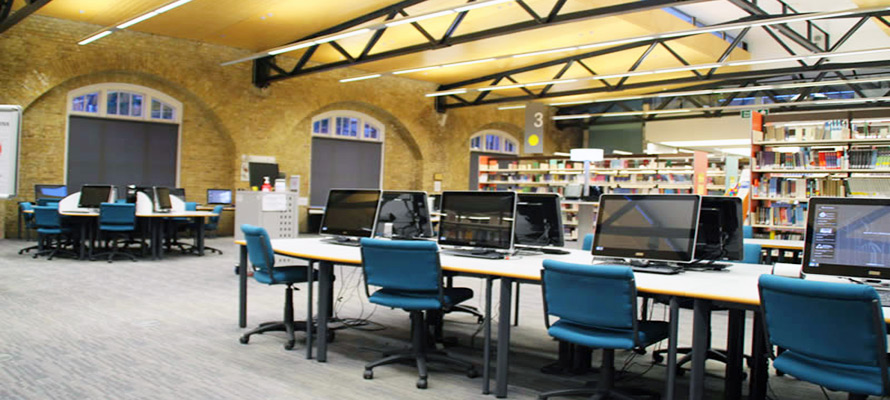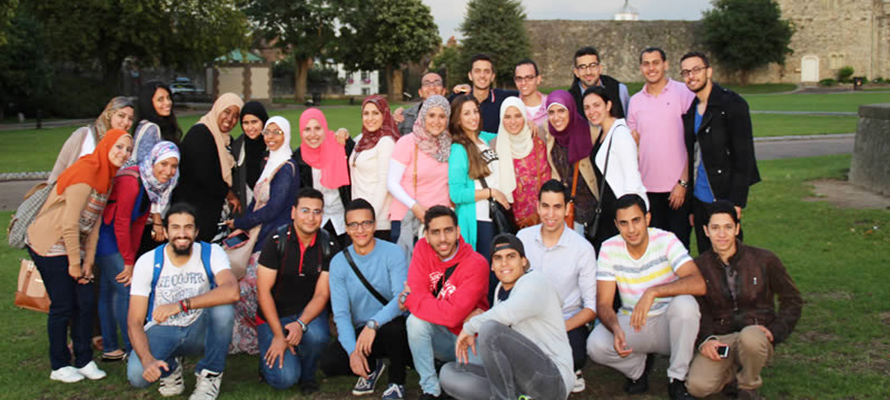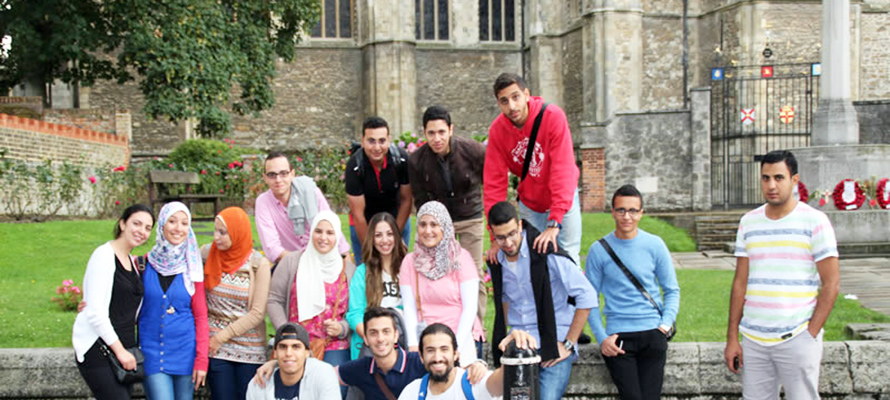Summer Training
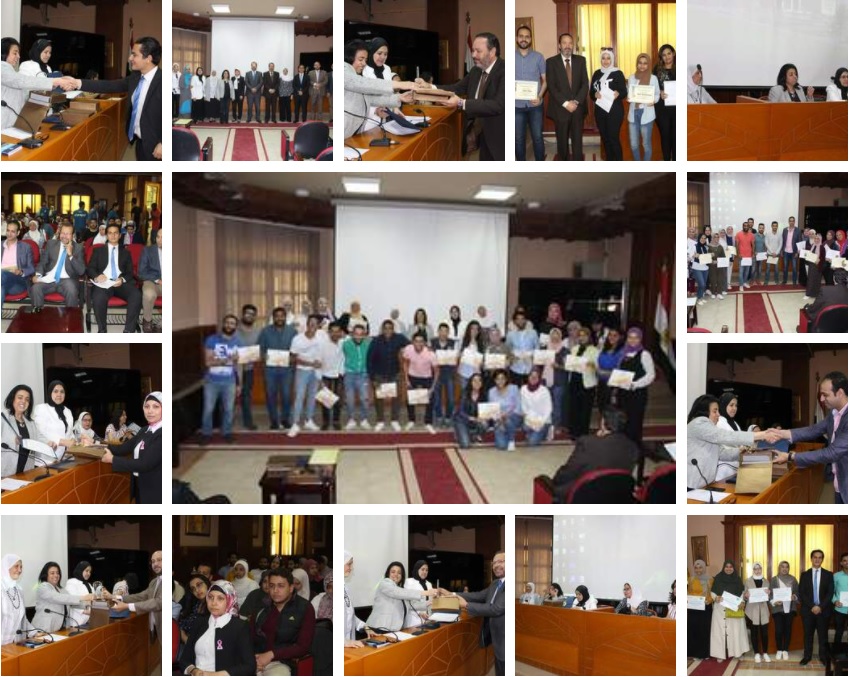
The Faculty of Pharmacy at MSA University aims at the graduation of a competent pharmacist who competes in the work market. MSA faculty of Pharmacy committed to high quality and continuous education. In addition it emphasizes on scientific research, community service and development. To achieve this, Faculty of Pharmacy trains students in different pharmaceutical disciplines to prepare them to compete effectively in the job market upon graduation. Training is an integral part of the pharmacy programme and is considered one of the graduation requirements. Training commences after the end of the 3rd academic year (at least 100 achieved credit hours). Every student will have the opportunity to spend certain hours (at least 300 hours) training in one or more pharmacy settings with especial emphasis on community and hospital pharmacies or national and international companies. Training may be accomplished during one or two summer vacations.
The Faculty offered some opportunities to the students for training in the last three years:
2019
- Companies: Astra-Zeneca, Global Napi, Sedico, Eipeico, Future, Al-andalus, Pfizer, Multiapex, Mena pharm
- Hospitals: El Arabi Hospital- Al moaalemeen Hospital - Egypt-air Hospital – Theodor-Bilharz
- Pharmacies: Abo-ali pharmacy, El-laiythy pharmacy
- Trust-lab
2020
- Hospitals: Baheya Hospital- Al moaalemeen Hospital - Egypt-air Hospital
- Training online: Astra-Zeneca, EVA, Sedico, Sandoz
- Webinars: Pediatric cancer hospital57357, EPCF
2021
- Hospitals: Baheya Hospital- Al moaalemeen Hospital - Egypt-air Hospital- El Arabi Hospital- Theodor-Bilharz
- Pharmacies: Abo-ali pharmacy
- Training online: Astra-Zeneca, EVA, Sandoz, Memphis, El Nile, Zewil city
AIMS:
The aims of this practical training are to expose the students to the rapidly growing information revolution in the pharmaceutical sciences and aid to graduate a competent pharmacist with high efficiency to participate in providing health care to community.
Summer Training Manual:
Ethics Committee
1. About the Research Ethics Committee (REC):
The Research Ethics committee (REC) of the Faculty of Pharmacy was established in November 2010.
The Ethics committee ensures that the Faculty is following the ethical and safety measures in research. The REC is a member in the Egyptian Network of Research ethics committees (ENREC) and is registered in the US Office for human research protection (OHRP) as an active valid Institutional Review Board (IRB) with an IRB # 00010491. Additionally, the faculty has signed a collaboration protocol with Cairo University- Institutional Animal Care and Use Committee (CU-IACUC) to establish a framework for collaboration in the animal research ethics field.
For any inquiries, please consult the coordinator of the committee Ass.prof. Reham Wasfi in person (Room G009) or by email: This email address is being protected from spambots. You need JavaScript enabled to view it..
2. Mission:
The mission of the Ethics Committee (EC) is to provide a multidisciplinary forum for the analysis and discussion of ethical standards effecting patient care, professional education and community interests. This mission is fulfilled through the Committee's advisory, educational, policy development, and service functions. The EC was established to formalize and specify the faculty commitment to promotion of high ethical standards in all of its operations. The purpose of the EC is to cultivate a pluralistic exchange of ethical values and concerns and to critically analyze that discussion for opportunities to enhance the ethical integrity of the Institution. The EC, through its distinguished members, is charged with assisting both researchers and students in conducting their research and any other operations within a consistent ethical framework. The EC, through its distinguished members, is charged with assisting researchers and students in the integration of ethical values into practice, policy, relationships, and organizational activities.
3. The Main Reasons why Ethical Approval is required:
In order for research to result in benefit and minimize risk of harm, it must be conducted ethically. MSA review processes are intended to ensure this whilst remaining sensitive to the needs of researchers& students. The researcher will not be covered by the College's insurance if ethical approval was not obtained prior to commencement. This means that should a participant make a claim regarding the research, then the staff or student would be personally liable. It is generally accepted that funders, such as research councils will not provide financial support for research that does not have ethical approval. Many publishers will now no longer accept for publication results of research that was not ethically approved. As such, researchers may need to present evidence of ethical approval in order to publish their results to the wider research community. Participants have the right to know who has access to their data and what is being done with it. Changes to modern society have seen an increase in litigation as a means of solving disputes. If ethical approval has not been obtained, the individual researcher bears personal responsibility for any claim. The aim of ethical review is to protect participants. They are a valuable part of the research process and not merely a means of accessing data. However, ethical review also helps to protect the researcher. By obtaining ethical approval you are demonstrating that you have adhered to the accepted ethical standards of a genuine research study which could increase recruitment potential.
4. Accepted Ethical Standards:
The following principles and values should be followed in all research carried out in the faculty:
Integrity: Researchers must always be honest.
Respect for persons: Researchers must treat participants and research subjects with respect. Obtaining informed consent from participant is an important form of respecting persons.
Beneficence: Researchers should always think of maximizing possible benefits and minimizing possible harms.
Non-malfeasance: Researchers must make efforts to secure the well-being of participants. The health conditions of researchers (Pregnancy and allergy) should be taken into considerations.
Justice/Fairness: Researchers should not only consider the benefits of the individual or organization but rather they should consider the benefits for the wider community.
5. Other important documents (Arabic language version):
1- Intellectual property bylaw - download here
2- Intellectual property awareness booklet - download here
3- Ethical covenant for students and faculty members - download here
Graduation Research Projects.
1. Welcome Note:
Welcome to Graduation projects committee page at Faculty of Pharmacy - MSA University, where we are committed to participate in graduating well-educated pharmacists. Our graduates can fulfill their professional duties competently and matches the needs of the industry and the local job market. Since the establishment of the graduation projects committee in 2008, we are committed to offer our students the opportunity to explore new areas of study and go beyond the restrictions of current knowledge to make new innovations. This mission is achieved through our experienced faculty members who provide time and effort to personalize the students’ research experiences. In addition, the students benefit from our facilities that range from fully equipped laboratories to our e-libraries and e-learning system.
2. Introduction:
October University for Modern Sciences and Arts is the first University in Egypt to introduce Research Project courses for pharmacy students. Independent Studies in Pharmaceutical Sciences (RS 501) and Research Project (RS 502) courses are the two project courses in the final year. It is equivalent to 10 credit hours (4 credits in the 9th semester and 6 credits in the 10th semester). Independent Studies in Pharmaceutical Sciences course is focused on establishing the scope of the work, problem definition, data collection, literature review, research methodology, data analysis, and finally conclusion of research plan for the next semester project. The group of students working on a specific project has to submit a collective report of their work, showing the contribution of each of them. The research project is designed to allow the students to work in groups each with well defined individual tasks to acquire new knowledge and skills independently. Group work allows students acquire teamwork, organization, and communication skills. Other skills acquired are running meetings, making collective decisions, time management, writing reports, and oral presentations. Students must adhere to the university safety lab measures while conducting their research. As the aim of the Faculty of Pharmacy-MSA University to introduce distinguished graduation projects, accordingly, the faculty hold collaborations with different hospitals and research institutes as The Children’s Cancer Hospital 57357 and The National Research Centre. These collaborations give the students a pronounced opportunity to complete their practical work at these institutes using the most recent equipment and learning about the latest technologies. Besides, the idea of inter-departmental graduation projects is implemented where this type of projects establishes in the students’ minds that cooperation between different research fields is a prerequisite for a scientific research to reach the scope of implementation. The high quality of the research projects has its impact on presenting the work in national, regional and international conferences.
3. Aims:
The aims of the course are to enable the student to:
4. Learning Outcomes:
Upon completion of the course, the student will be able to:
5. Graduation Projects Archive:
Bioequivalence Center

1. Introduction:
- The newly established Bioequivalence (BE) Center at MSA University is the first nationally recognized licensed BE Center at an Egyptian private university. - The Center is established and being administrated by a team of highly skilled scientists and staff from faculty of pharmacy, in addition to several nationalities well-known consultants. - The BE center is based on many years of academic experience and deep understanding of quality system which has been internationally acknowledged. - The center provides excellent and compassionate care to every volunteer through modern state of the art clinics, accommodating facilities and highly trained, dedicated staff while maintaining strict compliance with the top clinical practice.
2. Mission:
3. Quality Policy:
4. Organization:
• General Manager: Dr. Dina Wahba.
• Technical Manager: Dr. May Amin.
• Quality Assurance Manager: Ch. Ayatollah Mohamed Badr.
• Clinical Investigator: Dr. Abdel Wahab Mohamed.
• Study Coordinator: Dr. Asmaa Elrayess.
• Chief Analyst.
• Analysis Staff: Dr. Ahmed Yehia.
• Administration Staff.
• Physician: MSA BE Center has a Physician (Internal medicine), who is specialized for physical examination of the volunteers, observing them during taking the samples and also observes any side effects or adverse events.
• Nurse: specialized for sampling and plasma separation.
• Technician: help nurse to perform their work.
• Study Coordinator: prepare randomization plan and supervise the process of study coding.
• Cleaning Staff: keeping place clean and healthy.
5. Facilities:
1. Reception
2. Administration Room
3. Archiving Room
4. Drug Samples Store
5. Chemical Store
6. Staff Dining Room
7. Staff W.Cs
8. Instrumental Lab.
9. Data Processing Room
10. Preparation Lab.
11. Subject Housing Room: provided with 40 beds and 40 lockers for volunteers.
12. Samples withdrawal Room: well equipped for sampling withdrawal with centrifuge and deep freezer (-80◦ C).
13. Physician Room: well-equipped physician room with examination bed and blood pressure monitor. All first aid medications are kept in the first aid locker and oxygen cylinder.
14. Volunteer Dining Room: full facilities to prepare study meals.
15. Volunteer W.Cs.
6. Services:
1. Bioequivalence & Bioavailability studies
2. Bio-analytical services
3. Method development from scratches
4. Fine tuning of existing methods
5. Method validation according to validation protocol
6. Bio-waiver and comparative in-vitro dissolution studies
7. Formation studies
8. Training service
9. Research projects
British Partner
MSA Faculty of Pharmacy offers its students a British validate pharmacy programme that comprises up to date courses covering a wide spectrum of pharmaceutical and biotechnological sciences. Courses and credit hours lies within the frame work of the rules and regulations of ESCU as well as of our British partner, University of Greenwich. This collaboration is continuously monitored by external examiners governed under the umbrella of the British quality assurance and audit organization. MSA students receive two degrees upon graduation: an Egyptian certificate approved by ESCU and a British one granted by our UK partner. With their two certificates pharmacy graduates secure post graduate studies opportunities in UK, other European countries, Canada and USA.
The Overall Program Curriculum
Download: MSA university - Five Years Plan of Faculty of Pharmacy.
Dean's Welcome Note.

Welcome to Faculty of Pharmacy at MSA University, where we are committed to graduate well-educated pharmacists who are able to fulfill their professional duties competently in response to the needs of the industry and the local job market.Since the establishment of Faculty of Pharmacy in 2004, we can boast of its reputation of excellence and significant role in the development of our Egyptian society. Our students are granted the opportunity to explore new areas of study and go beyond the restrictions of current knowledge to make new innovations. We achieve this mission through our expertise faculty members who provide our students with their efforts and time to personalize their experiences, in addition to our facilities ranging from fully equipped laboratories and lecture halls to our e-libraries and e-learning system.
Actually, I am honored to be a member of this learning environment that is expanding our scopes and changing our lives.
Hoping that you enjoy your virtual visit to Faculty of Pharmacy. We look forward to welcoming you to our faculty to become a part of this unique educational environment.
With warm regards,
Prof. Dr. Hanan El Laithy
Dean of the Faculty of Pharmacy.
MSA University.
Introduction to Faculty of Pharmacy

MSA Faculty of Pharmacy offers up‐to‐date courses that cover a wide spectrum of pharmaceutical and biotechnological sciences, within the framework of the rules and regulations of the Egyptian Supreme Council of Universities (ESCU) as well as of our British partner. Programmes include specialized and updated courses in clinical pharmacy, pharmaceutical chemistry, Pharmaceutics and Industrial Pharmacy, Pharmacology and Toxicology, pharmacognosy, Microbiology and Immunology, biochemistry, behavioural science and management science in addition to courses in English, mathematics and computer scienceand computer science.
These courses are designed according to the international standards of the fast developing discipline in a Validation Agreement to be signed by MSA University and its UK partner. Our validated programmes offer MSA students the opportunity to receive two degrees upon graduation: an Egyptian certificate ratified by ESCU, and a British one granted by our UK partner.
Pharmacy students at MSA University are exposed to the rapidly growing information revolution in the Pharmaceutical Sciences, and are supplied with the latest laboratory equipment worldwide. Huge investments are geared to provide excellence in scientific education.
MSA Faculty of Pharmacy prepares pharmacists to play an active and creative role in their profession. Graduates may take up a career in Clinical Pharmacy, Hospital Pharmacy, Drug Industry, Community Services or Pharmaceutical Research.
Faculty of Pharmacy at MSA University is the only faculty of Pharmacy in Egypt that requires a graduation project, which highly qualifies its graduates for the practical field, especially if they intend to join the international workforce.
The Faculty of Pharmacy of October University for Modern Sciences and Arts is a pioneer in tutelage, scientific research, and community service at the local and regional levels, and holds an advanced position among its counterparts in international Pharmacy subject ranking.
The Faculty of Pharmacy of October University for Modern Sciences and Arts is nationally accredited, has British partnership, and is committed to producing graduates who are able to compete in national and international job markets and entrepreneurship, and to be an effective member of the medical team providing best medical care, while heeding professional ethics, through an outstanding academic programme and proficient academic staff. The faculty is devoted also to provide effective community services, and exceptional applied scientific research.
- Support faculty competitiveness
- Academic Excellence
- Distinct applied academic research
- Distinct community service
- Sustainable development
- Ensuring institutional effectiveness
- An influential university life
- Entrepreneurial spirit
- Student centred
- Accountability
- Inclusiveness
- Credibility
- Commitment to quality
- Institutional loyalty
- Teamwork
- Community orientation
-The Faculty of Pharmacy at MSA University is a pioneer in being validated from the University of Greenwich, UK. This validation privileges the study program by the close follow-up by both the University of Greenwich and the British Quality Assurance and Audit (QAA). Therefore, the pharmacy student is granted a dual-origin degree namely; a British one from the University of Greenwich and an Egyptian one approved by the Supreme Council for Universities.
- The continuous cooperation with our British partner (University of Greenwich) in all teaching and learning process.
- The faculty boosts by its facilities, in terms of its neo-classical look of the campus with its state-of-the-art buildings, laboratories and lecture halls with suitable spaces. All of which are air-conditioned and fully equipped in accordance with the standard specifications for quality.
- The faculty of pharmacy at MSA University is the first faculty in Egypt to implement the graduation projects for pharmacy students, which expands their perceptions, makes them more capable and creative in their careers and qualifies them to participate in international conferences and win first places in them.
- The faculty encourages the students to practice extra-curricular activities such as organizing and participating in student scientific conferences, the employment fair and various cultural activities with other faculties at the university such as; the Model United Nations (MUN), EPSF-MSA and MSA-WHO.
- The clinical pharmacy department at the faculty contributes to the graduation of highly qualified medical practioners that are able to interact with other health care professionals.
- The faculty adopts the interactive teaching system in lectures and laboratories using e-learning and some modern applications such as Kahoot, Quizziz and Socrative.
- The faculty offers a summer training program with close follow-up and evaluation of the student at the training setting.
- The bioequivalence center at faculty of pharmacy, provides its services to the pharmaceutical companies in Egypt.
- The research ethics committee and safety in laboratories committee develop the moral sense and commitment to credibility among students and faculty members and provides a safe environment for work.
- All faculty laboratories were granted three ISO certificates, including: the ISO certificate QMS 9001:2015 (Quality Management System); which is an approved certificate in the quality management system that leads to the improvement of processes and activities and increases the facility’s ability to control quality standards and ensures the systematic documentation of laboratory procedures. The second one is the ISO 14001:2015 EMS (Environmental management systems); which is a certificate for environmental management systems that provides its requirements to enable the control of the environmental impact of their services and operations. In addition to, the ISO 45001:2018 (Occupational Health and Safety Management System) certificate, which is a certificate for the foundations and principles of occupational health and safety management systems with British specifications issued by the British BSI Organization, which confirms and guarantees the quality and safety of the faculty laboratories and the Bioequivalence Center.
- Some of the assistant staff members obtained the post graduate degrees abroad, whether with the University of Greenwich or other universities. This acquaints them with the latest educational methods which will be transmitted to their colleagues and students upon their return.
- The presence of highly qualified staff members, who are experts in different scientific fields.
- Distinguished international scientific publication of the research work of the staff members.
- A number of staff members obtained a (Post Graduate certificate in higher education) diploma from the University of Greenwich.
- A periodic self-evaluation system for the staff members ensures the quality of the educational process.
- The campus includes a student services building (SSB) with an area of 674 m2 on two floors that includes a cinema hall, a meeting room, a guest room, a cafeteria and a restaurant.
- The presence of a food court, where there are a number of various restaurants, photocopy centers and an ATM machine.
- The campus includes a Roman amphitheater, with a capacity of 400 seats, and an opera theater located in Building G, which includes 4 circular halls and a capacity of 200 seats. Also, the campus area allows for more construction that serves its students. The University mosque is under construction. In 2014, the University had a cooperation protocol with one of the largest sports training companies (True gym) to manage the fitness training at the university gymnasium, which has an area of 350 square meters, and it is in a suitable place as it is on the ground floor and is well ventilated and equipped with a large number of modern fitness equipment.
Reasons to Join Faculty of Pharmacy
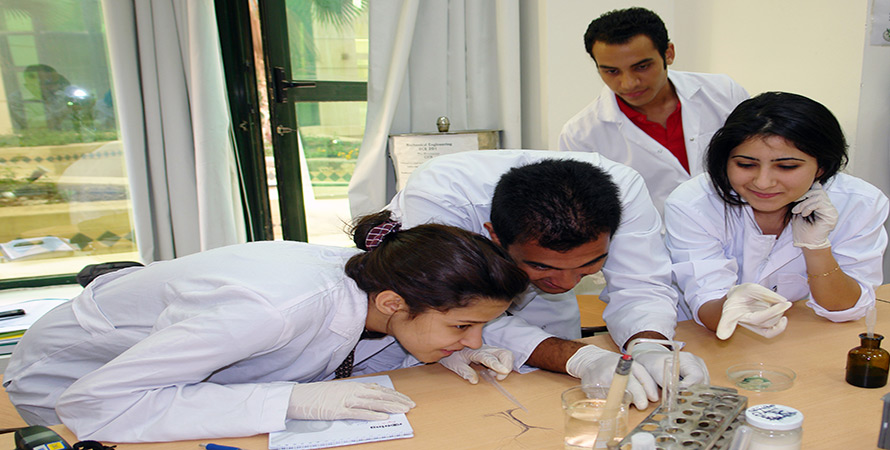
With the world population booming, and the subsequent demand for food and fuel, intelligent agriculture and a cleaner, greener environment are just some of the key global challenges facing us today. Biotechnology will provide you with the opportunity to enhance your research skills in using biological principles and systems to create new products, services and industries.
Biotechnology encompasses the pharmaceutical industry, including innovations in drug and vaccine design and regenerative medicine, as well as the biofuels industry and work in carbon sequestration and next-generation fuel production. Biotechnology will equip you with skills and knowledge that are very attractive to prospective employers.
A computer geek, a math nerd, a biology expert, all of them can have their concrete space in this field. A computer guy can delve into informatics in biology (to say the least), while a math geek can try his hand at bio statistics. I have seen instances where students who hate biology have taken a liking for it in the course of time. So no preconceived notions but a strong will to study would suffice.
Recombinant DNA technology is used for production of specific enzymes, which enhance the rate of production of particular range of antibodies in the organism. The hormones such as somatostatin, insulin and the human growth hormone can be synthesized easily and cheaply.
One of the best known applications of genetic engineering is that of the creation of genetically modified organisms (GMOs). Future applications of GMOs include bananas that produce human vaccines against infectious diseases such as Hepatitis B, fish that mature more quickly, fruit and nut trees that yield years earlier, and plants that produce new plastics with unique properties.
Defective genes in an organism cause genetic disorders. If a defective gene could be identified and located in a particular group of cells – it could be replaced with a functional one. The transgenic cells are then planted into the organism, resulting in a cure of the disorder.
DNA fingerprints are useful in several applications of human health care research, as well as in the justice system. DNA fingerprinting is used to diagnose inherited disorders in both prenatal and newborn babies in hospitals around the world. DNA fingerprint information can also help in developing cures for inherited disorders. DNA fingerprints helps to link suspects to biological evidence – blood or semen stains, hair, or items of clothing – found at the scene of a crime and help in solving crime.
Due to the revolutionary development of biotechnology during last couple of decades agriculture has drastically advanced. Sensational achievements were made in both plant cultivation and animal husbandry.
Improvement in disease control, efficiency of reproduction, yields of livestock products i.e. meat, milk, wool, eggs, composition of livestock products i.e. leaner meat, feed value of low quality feeds i.e. straw; are some of the applications of biotechnology.
One of the major scientific revolutions of the twentieth century was the breaking of the genetic code and the development of tools that enable scientists to probe the molecules of life with incredible precision. Now, in the twenty-first century, these developments in biology are being married with the use of ever-increasing computer power to help us face the challenges that the new century brings. Bioinformatics is the name given to the new discipline that has emerged at the interface of biology and computing.
From new drugs that address our medical needs and fight epidemics and rare diseases, to industrial processes that use renewable feedstock instead of crude oil to lower the impact on the environment and crops that are able to grow in harsh climatic conditions and ensure safe and affordable food, biotech can and will pay economic, social and environmental dividends.
There any many examples include the production of gasoline from ethanol which in turn is produced from sugar; the production of insulin using recombinant DNA technology; the production of hepatitis B vaccine using recombinant DNA technology and the extraction of copper using mineral leaching bacteria. The alternative inputs are oil for gasoline, porcine prancreases for insulin, human blood for hepatitis vaccine, and the conventional mining techniques for copper.
A wide variety of microorganisms are now being employed as tools in biotechnology to produce useful products or services. Raw materials can be converted to useful finished products both by ordinary chemical processes and by biological means. Generally, the costs of chemical conversion are quite high as the reactions require high temperature or pressure. In contrast, biological alternatives, using microbes or cultured animal or plant cells, operate at physiologically normal conditions of temperature, pressure, pH, etc..
In future biotechnology will be accredited for some revolutionary technology. Recent advances in bioenergy, bioremediation, synthetic biology, DNA computers, virtual cell, genomics, proteomics, bioinformatics and bio-nanotechnology have made biotechnology even more powerful. Recent discovery of conduction of electricity by DNA and its behavior as a superconductor has opened a new realm in modern science. In future biotechnology will have profound impact in world economy. Biotechnology is a golden tool to solve some of the key global problems like global epidemic, fatal diseases, global warming, rising petroleum fuel crisis and above all poverty.
Admission Requirements for Faculty of Pharmacy.
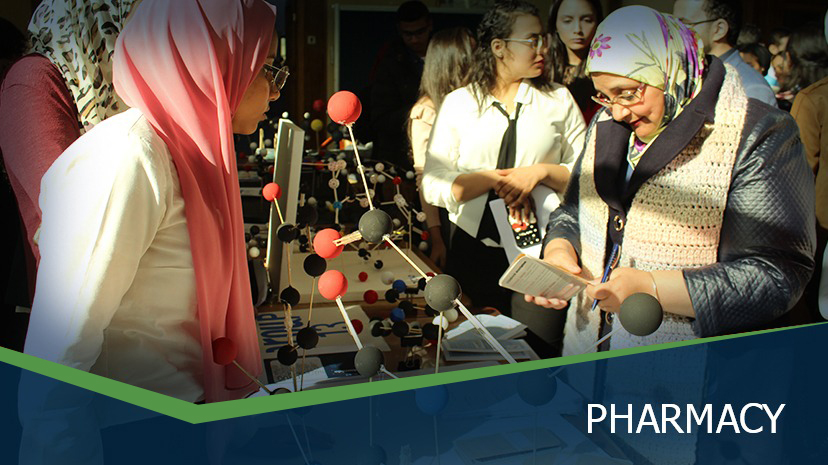
* Other foreign certificates including certificates from Arab countries are evaluated at the Admission Office in accordance to the regulations set by the Egyptian Ministry of Higher Education.

